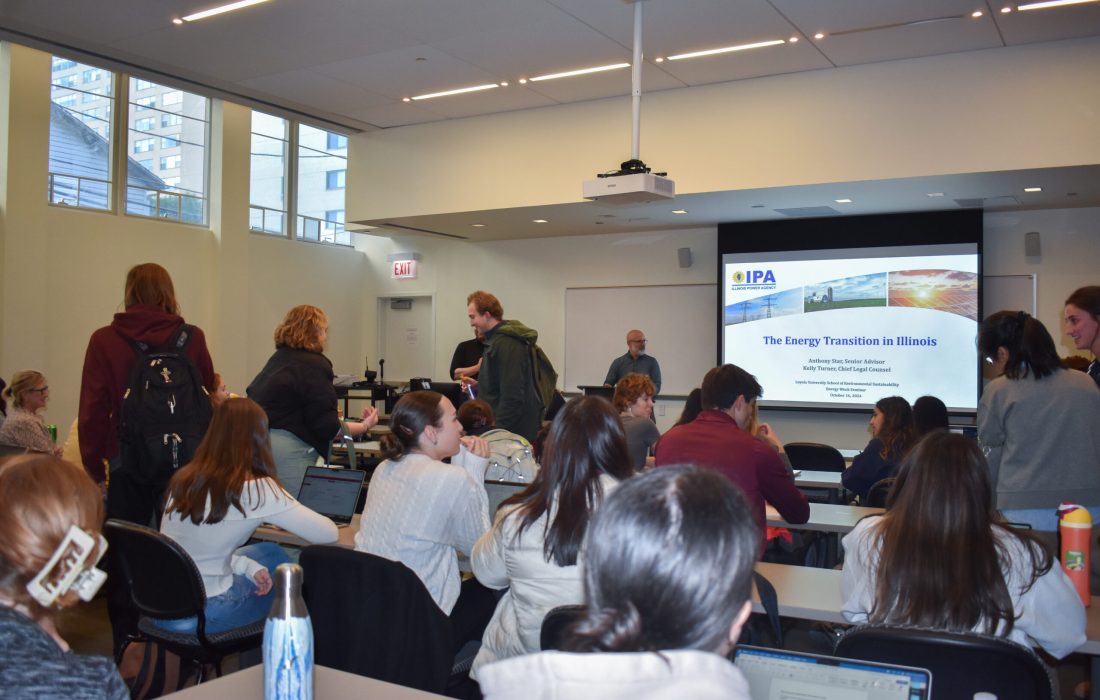The event is part of a larger initiative through the university to bring to light the steps they are taking towards a greener campus.
Energy Week Brings Awareness for Sustainability on Campus
Loyola’s Office of Sustainability hosted Energy Week Oct. 14-18 to focus on the university’s efforts in promoting clean energy and energy conservation.
Energy Week is part of a larger effort by Loyola to highlight various aspects of the university’s sustainability efforts. Loyola hosts similar events each month such as Transportation Week held in September and Food Week in October .
The week began Oct. 14 with a showing of the documentary “People of a Feather: Survival in the Canadian Arctic” in honor of Indigenous People’s Day. It was followed by a seminar showcasing efforts of the Illinois Power Agency Oct. 16 and then a separate climate action plan meeting later in the day.
Representing the IPA, Senior Advisor Anthony Star and Chief Legal Counsel Kelly Turner participated in the seminar and gave a comprehensive look at the energy landscape in Illinois, including their approach to topics ranging from transmissions and grid operators, to labor and workforce development.
Assistant professor of Environmental Policy, and panel organizer, Gilbert Michaud said he believes understanding energy concepts and being an advocate in communities is a solid first step towards contributing to sustainable development. As a Law and Policy Scholar, Michaud said he hopes students were able to use Energy Week as a way of connecting with industry professionals.
“I always encourage students to get out there and take chances,” Michaud said. “Hopefully, via Energy Week, Loyola students are getting connected to practitioners out in the field who can help them get their foot in the door to try this work.”
A main focus of the IPA seminar was how energy policies can vary widely at the state level across the U.S., creating a confusing mix of approaches. Star and Turner said this has arised due a lack of cohesive federal energy policy.
The seminar explained Illinois’ unique policies, such being the only state in the Midcontinent Independent System Operator which has deregulated system operators. This means energy companies operate in a competitive market environment, which may raise reliability concerns.
Drew Pellico, an environmental science and sustainability graduate student, said he thought the IPA presentation provided a great introduction for those who are less familiar with energy issues and eager to learn more about the state’s renewable energy challenges.
Fourth-year environmental science major Kate Knowles said she attended the Oct.16 seminar because she interns at a renewable energy company, US Clean Energy, where she’s gained a lot of knowledge in the field, and was interested in learning more.
“The energy industry is really convoluted and confusing,” Knowles said. “Having professionals who work in the field every day there to explain the details and answer any questions is super helpful.”
IPA speaker Kelly Turner spoke on how the growing use of electricity from technologies like electric vehicles and AI could stress the energy systems more than previously anticipated. For example, Turner said one search in Chat GPT uses enough electricity to power a neighborhood.
Illinois is planning for future increases in electricity demand, potentially altering long-standing assumptions about the grid, the speakers said during the presentation.
Knowles said the presentation made her more open to nuclear energy, despite previous concerns about nuclear waste. Although she has always supported solar and wind, these can generate non-recyclable waste which prompted her to reconsider whether any energy sources are truly renewable and sustainable.
Gilbert said the presentation can inspire students by demonstrating how renewable energy transitions can reduce carbon emissions and address climate change. He thinks connecting the state’s renewable portfolio standard and energy policies to on-campus issues would make the topic more relatable for students.

The second event of the day highlighted the importance of student involvement. Hosted by Loyola’s Director of Sustainability Dr. Aaron Durnbaugh, students from various environmental organizations gathered to discuss the Climate Action Plan. Everyone was seated in an organized setup, and a questionnaire was distributed to collect opinions on student involvement.
Second-year environmental science student Andrew Conover, the Office of Sustainability intern in charge of student engagement for the Climate Action Plan 2.0, helped host the event.
“We hosted this event to hear from the stakeholders of the plan,” Conover said. “Their opinions matter, and we are now in the process of refining the plan to better align with students’ desires.”
The discussion kicked off by reviewing Loyola’s history of environmental efforts, and then went into detail explaining the university’s previous successes and accomplishments, emphasizing the extent of possible change.
The original Climate Action Plan was developed in 2014 with the goal of achieving carbon neutrality by 2025 for directly controlled emissions. The plan specifically considered a wide range of strategies for achieving this goal, including renewable energy options, the promotion of sustainable transportation and improvements in waste management, according to its website.
Conover said he feels the first Climate Action Plan made substantial progress in establishing the university as a sustainable institution compared with other universities but thinks the new plan should take care of any “dirty” investments, which are indirect. “Dirty” investments refer to assets owned by Loyola which benefit from environmentally destructive industries.
While he recognizes this may be difficult considering the nature of the university’s investments, he said the global trend is moving toward sustainability, and Loyola should get ahead of the curve by making sustainable investments.
The objective of Energy Week is to raise awareness of and incentivize sustainability practices on campus. Faculty and students emphasized the importance of student engagement beyond the School of Environmental Sustainability.
“If we want to tackle Climate Change,” Conover said. “We must all be involved, not just those who devoted their degrees”
Topics
Get the Loyola Phoenix newsletter straight to your inbox!



